Trump is acquittedpublished at 20:48 GMT 13 February 2021Breaking
Former President Donald Trump has been acquitted by the Senate on the charge of inciting the 6 January riot.
Former President Trump is acquitted at his impeachment trial over the deadly attack on the US Capitol
Trump faced a single charge of inciting a mob of his supporters to ransack Congress
Fifty-seven senators voted to convict him - 10 short of the number needed to convict
Seven Republicans turned against their former president
Top Republican Mitch McConnell lambasted Trump's election 'lies'
But said he could not convict him because he is now a private citizen
Democratic House Speaker Nancy Pelosi called the Republicans 'cowards'
A statement from Trump called the verdict a witch hunt but vowed to carry on the fight
Edited by Tom Geoghegan
Former President Donald Trump has been acquitted by the Senate on the charge of inciting the 6 January riot.
After hours of closing arguments, we're now in the homestretch of this impeachment trial.
The clerk has just read aloud the article of impeachment.
Next, senators will vote on whether to acquit or convict Donald Trump on the charge of inciting the Capitol riot.
As he concludes, Trump counsel van der Veen calls on the Senate to take up the other issues facing the nation that really matter - and end this trial.
"You can defend the Constitution, you can protect due process, and you can allow America's healing to begin," he says.
"I urge the Senate to acquit and vindicate the Constitution."
With that, the defence has finished their closing arguments, ceding the balance of their time.
And lead prosecutor Raskin is back up.
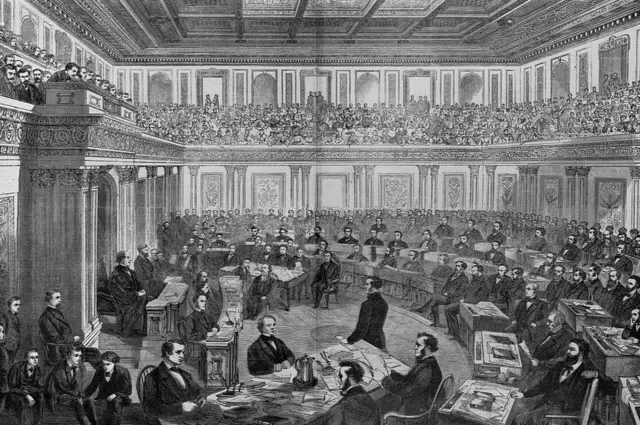 Image source, Library of Congress
Image source, Library of CongressJohnson's Senate trial
OK, so it looks like Donald Trump will go the same way as two other impeached presidents (and himself a year ago) who were cleared at trial.
What happened to them?
The other two presidents are Andrew Johnson in 1868 and Bill Clinton in 1998.
Narrowly escaping conviction by one vote, Johnson hobbled on as president, his powers curtailed. Those final months were beset with power struggles and at the end of his term, Democrats lost the White House to Republican Ulysses Grant.
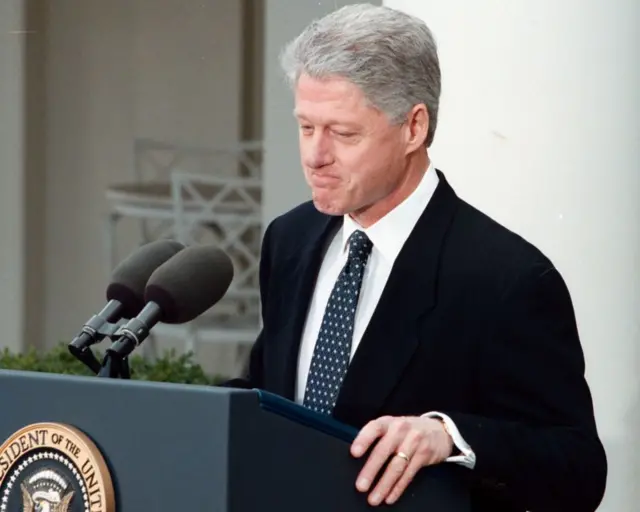 Image source, Getty Images
Image source, Getty ImagesBill Clinton addresses the press after Senate acquits him
Clinton fared better - he ended up resisting calls to resign and left office in 2001 with a 65% approval rating, the highest of any of his predecessors in half a century.
What about Richard Nixon and the infamous Watergate scandal, you may ask?
An impeachment vote for Nixon never occurred, though articles were written up - because on 8 August, 1974, Nixon announced his resignation. He remains the only US president in history to have done so.
The attack on Congress was premeditated and pre-planned therefore Trump's speech had no bearing on it, insists defence lawyer Michael van der Veen.
In his closing arguments, he berates the prosecution's case for not being based in law.
His tone is calm and more muted than earlier this morning, when he raised his voice and appeared to be quite punchy.
Van der Veen reiterates his previous arguments that the former president did not instigate violence and that convicting him "can only be seen as an effort to censor speech" and quash "differing opinions".
"Hopefully we can all leave this chamber in uniform agreement that all rioting is bad," he says.
Allow X content?
This article contains content provided by X. We ask for your permission before anything is loaded, as they may be using cookies and other technologies. You may want to read X’s cookie policy, external and privacy policy, external before accepting. To view this content choose ‘accept and continue’.
The Democrats have finished their closing arguments.
Next, the defence will have up to two hours - though the indications are that they won't take the full amount of time.
Which means we could have a final vote very soon.
It's a dark Saturday with temperatures just above freezing in Washington DC. The senators have traipsed back to the Capitol building for day five of Donald Trump's second impeachment trial.
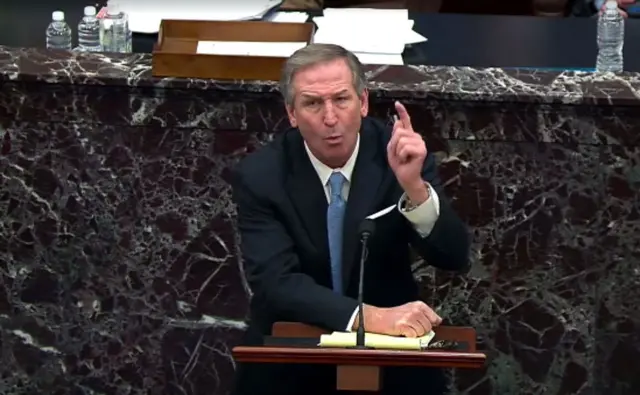 Image source, Getty Images
Image source, Getty ImagesTrump's lawyer was very fired up when he opened the day's proceedings
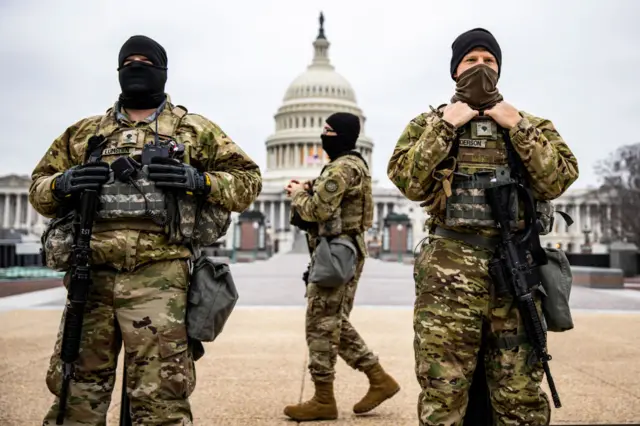 Image source, Getty Images
Image source, Getty ImagesNational Guard troops surround the Capitol
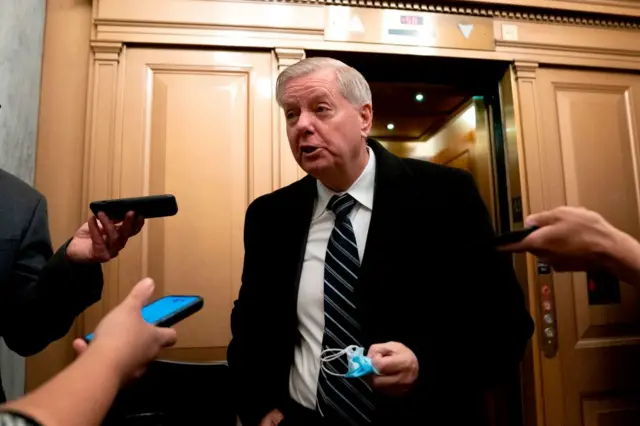 Image source, Getty Images
Image source, Getty ImagesRepublican Senator Lindsey Graham speaks to reporters before surprisingly breaking with his party to vote to call witnesses
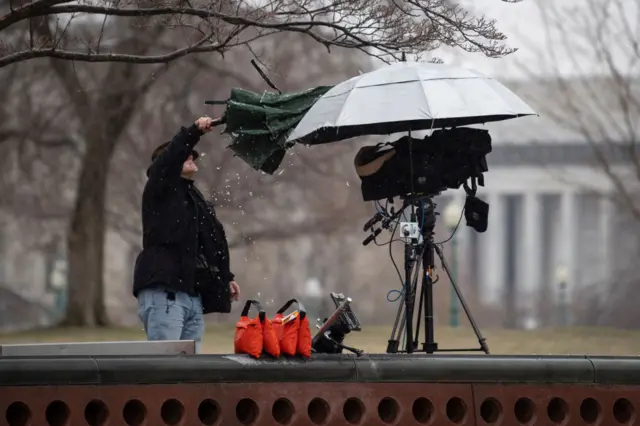 Image source, Getty Images
Image source, Getty ImagesA member of the media brushes ice off umbrella
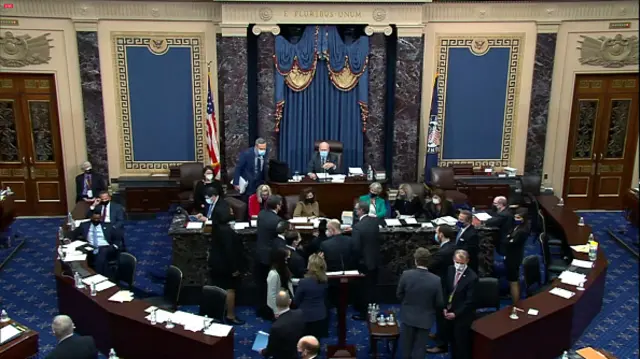 Image source, Getty Images
Image source, Getty ImagesChaos ensued on the Senate floor over the decision to call witnesses, and it was unclear what was happening.
The House charged Trump with "incitement of insurrection", claiming he made false allegations of election fraud and encouraged his supporters to storm Congress.
But remember, the trial in the Senate is political, not criminal.
That means when lawmakers are debating incitement, they do not need to prove it in a legal sense, but rather that the former president's conduct was in fact a "high crime and misdemeanour", per the Constitution's impeachment clause.
Of course, that's a rather vague phrase - intentionally so, by the writers of the US founding document.
Let's look at history for some clarity.
Alexander Hamilton wrote in the Federalist Papers that impeachment focuses on "those offenses which proceed from the misconduct of public men, or, in other words, from the abuse or violation of some public trust".
And the House Judiciary Committee wrote , externalin the aftermath of Watergate that the phrase goes further than crimes and includes "exceeding the powers of the office", "behaving in a manner grossly incompatible with the proper function of the office" or using the power of the presidency "for an improper purpose or personal gain".
So again, there's no need to prove Trump broke the law - rather, that he broke the trust of his office.
Earlier in his closing remarks, lead Democratic prosecutor Raskin asked Republican senators to not bend to Trump's will, quoting a number of Founding Fathers to emphasise his point.
Allow X content?
This article contains content provided by X. We ask for your permission before anything is loaded, as they may be using cookies and other technologies. You may want to read X’s cookie policy, external and privacy policy, external before accepting. To view this content choose ‘accept and continue’.
Closing arguments are continuing after a short break.
First up is Democratic congresswoman Madeleine Dean who is going over some of the evidence aired earlier in the week against Trump.
She shows clips leading up to the insurrection where he insisted the election was rigged and the result was false.
The House impeachment managers are well into their two hours to summarise their closing arguments. Trump's defence team is up next, for up to another two hours. Then the Senate will vote.
 Anthony Zurcher
Anthony Zurcher
BBC North America reporter
In a morning of Senate drama, the prospects of a trial extended by witness testimony started out slim, became very real and then vanished to nothing in an instant.
It was enough to leave Donald Trump’s critics on the left with a bad case of whiplash - and more than a little angry.
“Democrats just showed they can be as feckless as the Republicans are ruthless,” tweeted University of Florida Professor Michael McDonald, external.
Many on the left had held out hope that witness testimony would allow a fuller, more complete record of Trump’s attitude and behaviour during the Capitol Hill riot to come to light.
Even if it didn’t change enough minds among Republican senators to convict, it was a common view that the purpose of the impeachment trial was larger than that. It was about how history would record the last days of the Trump presidency.
Instead, they had the proverbial rug yanked out from under their feet.
“I'm still in shock", tweeted Rachel Bade of Politco, external.
“Democrats FINALLY HAD THEIR MOMENT to take a shot at Trump. Call in witnesses. Show the world what he did on Jan 6 beyond what we know. And they chose not to. All for the sake of Biden's agenda.”
There is a very real risk that the morning’s events will lead to blowback against Senate Democrats and, by extension, President Joe Biden.
They may have wanted the trial to wrap up so they could focus on Biden’s legislative agenda, but it may have come at the price of cracking the Democratic base.
House manager Cicilline has just wrapped his closing speech, where he briefly walked the Senate through all the evidence he and his team presented over two days.
"[Trump] wasn't furious or sad or shocked like virtually everyone else in America," Cicilline adds.
"Rather than rush to our aid...he watched the attack on TV and praised the mob to McCarthy as more loyal to him. More upset about the election. That was all that mattered."
Check out our videos below if you need a quick recap on the key points made and new footage revealed by Democrats during the trial.
Joe Neguse: 'We humbly ask you to convict President Trump'
New video of police under attack in Capitol riot shown at Trump trial
Capitol mob got close to Pence, Romney and Schumer, new footage shows
In case you missed it earlier, here's Trump's defence lawyer speaking passionately on the Senate floor.
Watch Michael van der Veen raise his voice and pretend to have handcuffs on and later get defensive when senators laugh at his suggestion that Nancy Pelosi travel to his office in Philadelphia for a deposition.
Trump lawyer: 'I don't know why you're laughing'
Aside from a few hours where it appeared the trial could go on for weeks if witnesses were called, we're back to being almost certain the trial will end today.
Earlier Mitch McConnell said he will vote to acquit Trump, meaning it's nearly impossible Democrats will convince 17 Republicans to convict, with only closing arguments left.
Jamie Raskin has kicked off the prosecution's closing arguments, which could last up to two hours before the same time is given to the defence.
The countdown to the vote begins...
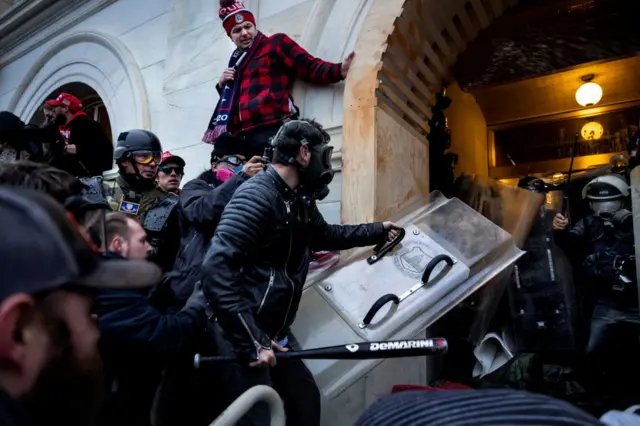 Image source, Getty Images
Image source, Getty ImagesRaskin says Trump "indoctrinated the mob" with his election fraud claims, setting the stage for the violent riot.
Our Reality Check team has fact-checked a number of these claims here, if you need a refresher:
If you're "flirting with the idea that Trump was an innocent victim", Raskin continues, he says the key question in resolving doubts is: "How did Donald Trump react when he learned of the violent storming of the Capitol and the threats to senators, members of the House and his own vice-president as well as the images he saw on TV of the pummelling, beating, and harassment of our police officers?"
Did the then-president "spring into action" to save them, Raskin asks?
"We were begging... and he was nowhere to be found. That dereliction was central to his incitement of insurrection... It reveals a state of mind that day."
 Barbara Plett Usher
Barbara Plett Usher
BBC News, Capitol Hill
There was a dramatic twist in the trial.
Senators were expecting to wrap up with closing arguments today, because both sides had presented their cases in exceptionally speedy impeachment proceedings.
And then a House Republican, Jaime Herrera Beutler, offered new details about a phone call that suggested Trump was indifferent to the violence - even though lawmakers and his own vice-president were in danger.
So the lead prosecutor Jamie Raskin said she should testify to put a rest to the lingering doubt.
But the move to call witnesses threatened to significantly delay the trial, something neither side wanted.
So after emergency consultations, it was decided to read the congresswoman’s statement into the record rather than depose her or bring in other witnesses. The Senate is now proceeding with closing arguments.
And it’s still unlikely to muster the two-thirds majority needed to convict. Even more so after the powerful Republican leader Mitch McConnell signalled today he would vote to acquit.
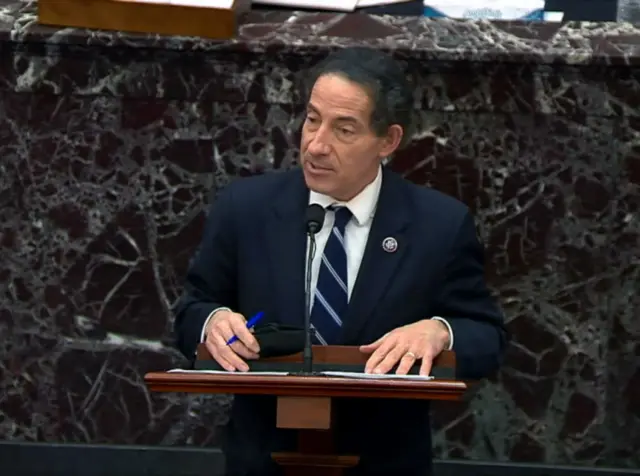 Image source, Getty Images
Image source, Getty ImagesLead impeachment maager Raskin
We've now begun closing arguments - there are four hours allotted for this in all.
House managers are up first and lead prosecutor Jamie Raskin takes the stand.
He begins by again bringing up the McCarthy-Trump phone call.
"In this uncontradicted statement that has just been stipulated as part of the evidentiary record, the president said, 'I guess these people, the mobsters the insurrectionists, are more upset about the election than you are'."
Raskin argues that conduct is "part and parcel of the constitutional offence that he was impeached for, namely, incitement to insurrection".
He says it's "further evidence of his intent to incite insurrection in the first place".
Raskin offers up yet another fire analogy.
Suppose you are charged with arson, he says. It would be "extremely relevant" if you ran over and tried to put out the flames after, or if you "stand by and watch it gleefully".
So after all of that, the Senate has come to an agreement and there will be no witnesses or further depositions.
Both Trump's defence and House prosecutors have agreed to enter into the record a copy of Congresswoman Herrera Beutler's statement.
There are no further motions.
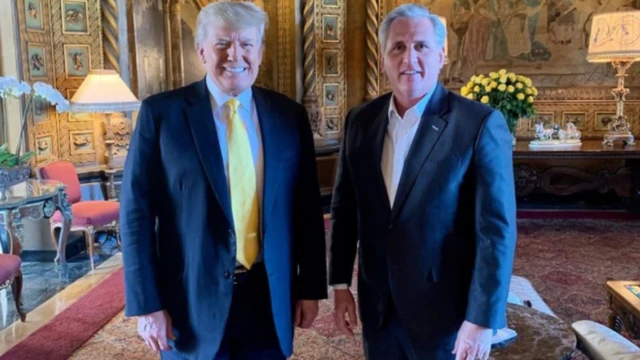 Image source, Save America Pac
Image source, Save America PacThe furious phone call between Republican House leader Kevin McCarthy and Donald Trump is now at the centre of the Senate's witness debate.
But despite the expletives and angry words between the two Republicans on 6 January, it's important to remember that McCarthy eventually had a change of heart.
He walked back his critique of the president in the days that followed. He voted against impeaching Trump.
And on 28 January, he made headlines for paying the former president a visit at his Mar-a-Lago Florida resort.
Read our North America editor Jon Sopel's analysis of that meeting here.
The trial has resumed as the Senate attempts to sort out how, and if, to handle the calling of witnesses. House manager Jamie Raskin is now speaking.